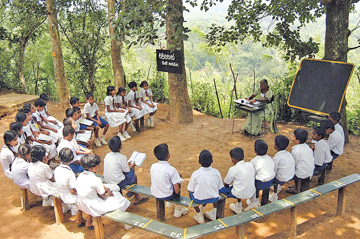Innovations to ensure accountability in education
Prof Rajiva WIJESINHA, MP
 |
|
Prof Rajiva
Wijesinha, MP |
I have not written much about education recently because much else
seemed more important, indeed urgent. However recent visits to several
rural areas, and interactions with students and other stakeholders in
schools and elsewhere, have made me realize how woeful our situation is.
Many schools are without Principals, including, astonishingly, two
National Schools in the Beliatta area. One of these has suffered a
severe loss of students in recent years, which leads to an even greater
strain on more popular urban schools. Results for vital subjects for the
modern world, Maths, Science and English, are abysmal in rural areas,
not surprisingly because many schools in those areas are without
teachers.
Parliamentary colleagues
Students rarely go to class when they reach the Advanced Level,
because tuition seems more productive in terms of passing examinations.
In the old days, many areas were neglected because Education Ministry
had neither the inclination nor the resources to pay close attention to
schools in distant places. It was assumed that devolution would help,
but this has not happened, because the province too is far too large a
unit to ensure monitoring of distant schools. What then is the answer?
My own view is that responsibility should be allocated to even smaller
units, ideally the Education Zonal or even Divisional office.
Discussing this with Parliamentary colleagues however, I was told
that giving authority to such small units could lead to abuse. It was
pointed out that such units would not have the capacity to resolve
problems. At the same time it was recognized that better supervision was
needed, with closer awareness of actual problems on the ground.
One obvious measure to take is to ensure that accountability is to
stakeholders rather than to distant bureaucrats. It would be simple to
set up School Advisory Boards, not for single schools, because that
would lead to excessive interference, but for particular areas. The
ideal catchment area for this, I would suggest, is the Pradeshiya Sabha,
with all members asked to exercise a monitoring brief on all the schools
in the area. Members of Parliament, who now have to appeal either to
Education Minister or to the Provincial Education Minister when they
want problems resolved, could also be members of the Board. Such a Board
would thus advocate more effectively, with greater focus and assessments
based on a wider context than just sudden needs that are brought to the
attention of political stakeholders.
Training programmes
At the same time the Board should not consist only of politicians. It
should include retired educationists, Principals who have performed good
service and teachers who have produced good results in key subjects. It
should also include representatives of professions that are relevant to
education and child development, doctors and those involved in
vocational and sports and cultural training programmes.
Local system
The Advisory Board should have very clear responsibilities. First and
foremost, it should monitor staffing in schools. It could, as a
corollary of this, recommend from a local and knowledgeable standpoint
schools that might be amalgamated to promote educational productivity.
While obviously students should not have to travel too far, it makes no
sense to continue with a couple of schools less than ten miles apart
having just a few students in each class, with constant shortages of
teachers. Secondly, it should monitor educational achievement, obviously
through comparative assessment of examination results, but also by
sharing information about coverage of syllabuses, need for tuition etc
in schools in the same catchment area. It should also check on
extra-curricular activities, and the ability of Principals to lead.
Awareness of best practice in the area will help Principals to try to
build up teams of teachers functioning cohesively to ensure the rounded
development of their charges.
 |
|
Infrastructure facilities needed for rural schools. File
photo |
Thirdly, it should also promote planning for appropriate employment
for the products of the local system. Advocating for suitable vocational
training for the area, developing entrepreneurship amongst the young,
promoting cooperative mechanisms with regard to agri-business or cottage
industries, are all areas in which local School Advisory Boards could
contribute. They should aim to encourage better preparation for the
world of work for students in an area with adequate critical mass as it
were, but small enough to ensure individual attention. Some of this
coordination is envisaged in one of the best ideas to come out of the
Education Ministry in recent years, the development of centres of
excellence throughout the country. Leaving supervision of these only to
the ministry however may well lead to neglect of the other schools in
the area.
Practical suggestions
A Board that includes stakeholders with interest in all schools in
the area will be able to advocate for equitable development, and ensure
that all schools and thus all students will get the attention they
deserve.
Such coordination is particularly important in areas in which
children of different ethnic groups are kept segregated, with Sinhala
schools and Tamil schools and also separate Muslim schools that have no
obligation to work together. Of course in some places there is good
cooperation already, but this should exist everywhere as a matter of
principle, with stakeholders representing the different groups working
together to promote education in the area as a whole.
Coordination could also contribute to a better use of resources, with
sharing of playgrounds, halls, sports and musical equipment and even
trainers. It could also lead to joint cultural events and exhibitions,
joint fund-raising programmes, joint educational excursions.
I am aware that ideas such as the above will not appeal to
bureaucrats who tend to guard jealously their authority. But education
is an area in which, while authority may need to be exercised by
detached administrators, awareness of the ground situation is an
absolute necessity.
A conduit that can collect and collate and transmit education can
only be a positive force, and I hope this sort of system can be
considered and implemented soon. It can do no harm, it will channel the
energies of concerned Pradeshiya Sabha members in the right direction,
it will provide benchmarks to judge their performance as well as the
performance of the institutes under their purview. But I suspect a
system that does not take kindly to new ideas will not be able to take
such practical suggestions forward.
|



